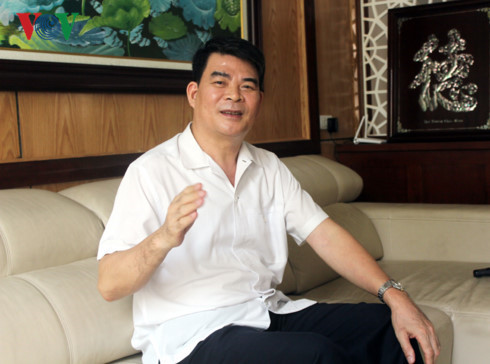'Merging departments and agencies must be done even more strongly'
Former Deputy Minister of Home Affairs Nguyen Tien Dinh supports the merger of multi-sectoral departments, but according to him, research is needed to find appropriate management methods.
The Ministry of Home Affairs is proposing to the Government to merge the two Departments of Finance and Planning and Investment into the Department of Planning and Finance; and to merge the Departments of Transport, Construction, Planning and Architecture of Hanoi and Ho Chi Minh City into the Department of Infrastructure and Urban Development.
Talking to reporters about this issue, former Deputy Minister of Home Affairs Nguyen Tien Dinh highly appreciated this proposal and said that the issue of merging departments and branches needs to be carried out more strongly.
 |
| Former Deputy Minister of Home Affairs Nguyen Tien Dinh. |
PV: Many experts believe that the merger of these departments will be a breakthrough in administrative reform, aiming to improve the effectiveness and efficiency of the civil service. What is your opinion on this proposal?
Mr. Nguyen Tien Dinh: For many years now, one of the important goals of administrative reform has been to reorganize the apparatus to make it more compact and simplify administrative procedures. The more cumbersome the apparatus, the more administrative procedures there will be. The more departments there are, of course, the more administrative procedures there will be. I strongly agree and hope to quickly promote the reorganization of the apparatus to be more compact.
The proposal of the Ministry of Home Affairs is very good, I even think it needs to be strengthened. In fact, in many countries with developed economies, there are only 12-13 ministries; in our country, there are currently 22 ministries and 8 government units, which is still very cumbersome.
To reorganize the apparatus, the key is to review the functions and tasks of State agencies; the State only handles important tasks, and the tasks that State agencies do not need to do or do ineffectively are transferred to private organizations and social organizations. Only through reviewing the functions and tasks can the apparatus be streamlined and the organization be reorganized.
If the old functions and tasks are still maintained, it will be impossible to arrange. Agencies will continue to complain about many things, and if they merge or downsize, their workload will be heavier.
PV:The proposal to merge the departments of the Ministry of Home Affairs focuses on localities, however, Ho Chi Minh City - one of the two largest cities in the country, does not agree with this proposal. In your opinion, why does Ho Chi Minh City not agree with this proposal, where is the problem?
Mr. Nguyen Tien Dinh: The functions and tasks of the departments, branches and local agencies are very large, because we always want to manage all the tasks, while it is not necessary to do so. The Party's Resolution and the administrative reform program have stated very clearly that we must review and transfer what does not need to be managed and what is not done effectively to social and private organizations, including services.
In fact, state agencies are directly performing many public services without focusing on policy making. We focus too much on the operation and organization of public services, leading to overload in many state agencies. If we rearrange and streamline the payroll without reviewing the functions and tasks, it will create a burden for state agencies. When reviewing the functions and tasks, the tasks that the state needs to focus on should be kept, and the tasks that need to be transferred should be transferred early, only then can we effectively reorganize the apparatus and streamline the team.
PV:We have previously merged multi-sectoral ministries, but in reality the goal of streamlining and compacting the apparatus and avoiding overlap seems to have not been well implemented?
Mr. Nguyen Tien DinhUp to now, the Party has affirmed that the multi-sectoral, multi-field Ministry is very correct and will continue to implement it in the coming time.
However, the process of implementing the multi-sectoral and multi-sectoral arrangement also needs to review the structure of the multi-sectoral ministries and departments as well as the relationship and State management methods for the multi-sectoral ministries accordingly. If we do not do this, our merger will be considered unsuccessful.
PV:Regarding the issue of merging departments, it will lead to a surplus of leaders and deputies. So, in your opinion, how should this problem be solved?
Mr. Nguyen Tien Dinh: There needs to be a policy, like Hanoi recently. When merging, there will be a lot of redundant deputy-level officials. Hanoi has a policy to resolve this situation, so as not to affect the thoughts and feelings of the officials. Due to the need to reorganize the apparatus, they have to stop working in leadership positions, so there needs to be a policy for those people, maybe reserving or arranging another job position. I think Hanoi has done a good job in this arrangement.
In the process of arranging multi-sectoral and multi-field ministries as well as at the department level, it is necessary to calculate and research how to operate the multi-sectoral and multi-field apparatus, not just mechanically merge.
PV:Some people say that when solving the problem of redundant deputy personnel, there should be a public recruitment exam so that those who stay and those who leave feel comfortable. What do you think about this opinion?
Mr. Nguyen Tien Dinh: For now, I think we should keep the old staff to ensure stability. In case of shortage, we should organize recruitment exams. The recruitment exam issue is not a new issue, in fact, many localities have organized recruitment exams in the past, not only for deputy level, but also for head level (like in Quang Ninh - PV).
PV:Thank you, sir./.
According to VOV
| RELATED NEWS |
|---|


